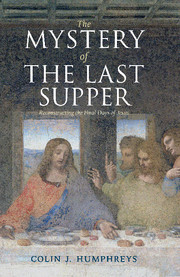Book contents
- Frontmatter
- Contents
- List of illustrations
- Foreword by I. Howard Marshall
- Acknowledgements
- 1 Four mysteries of the last week of Jesus
- 2 Dating the crucifixion – the first clues
- 3 The problem of the last supper
- 4 Can we reconstruct the Jewish calendar at the time of Christ?
- 5 The date of the crucifixion
- 6 The moon will be turned to blood
- 7 Did Jesus use the solar calendar of Qumran for his last supper Passover?
- 8 Does ancient Egypt hold a key to unlocking the problem of the last supper?
- 9 Discovering the lost calendar of ancient Israel
- 10 Was the lost ancient Jewish calendar used in Israel at the time of Jesus?
- 11 The date of the last supper: the hidden clues in the gospels
- 12 From the last supper to the crucifixion: a new analysis of the gospel accounts
- 13 A new reconstruction of the final days of Jesus
- Notes
- Bibliography
- Index of biblical and other ancient sources
- General index
11 - The date of the last supper: the hidden clues in the gospels
Published online by Cambridge University Press: 03 May 2011
- Frontmatter
- Contents
- List of illustrations
- Foreword by I. Howard Marshall
- Acknowledgements
- 1 Four mysteries of the last week of Jesus
- 2 Dating the crucifixion – the first clues
- 3 The problem of the last supper
- 4 Can we reconstruct the Jewish calendar at the time of Christ?
- 5 The date of the crucifixion
- 6 The moon will be turned to blood
- 7 Did Jesus use the solar calendar of Qumran for his last supper Passover?
- 8 Does ancient Egypt hold a key to unlocking the problem of the last supper?
- 9 Discovering the lost calendar of ancient Israel
- 10 Was the lost ancient Jewish calendar used in Israel at the time of Jesus?
- 11 The date of the last supper: the hidden clues in the gospels
- 12 From the last supper to the crucifixion: a new analysis of the gospel accounts
- 13 A new reconstruction of the final days of Jesus
- Notes
- Bibliography
- Index of biblical and other ancient sources
- General index
Summary
On the first day of the Feast of Unleavened Bread, when it was customary to sacrifice the Passover lamb, Jesus' disciples asked him, ‘Where do you want us to go and make preparations for you to eat the Passover?’
(Mark 14:12)As you enter the city [Jerusalem], a man carrying a jar of water will meet you. Follow him to the house that he enters, and say to the owner of the house, ‘The Teacher asks: Where is the guest room, where I may eat the Passover with my disciples?’ He will show you a large upper room, all furnished. Make preparations there.
(Luke 22:10–12)When it was almost time for the Jewish Passover, many went up from the country to Jerusalem.
(John 11:55)In March 2010 I was invited to be an observer at a murder trial at the Old Bailey, the Central Criminal Court in London. The murder had occurred eight months previously and the witnesses disagreed on the details of what had happened. The prosecution and defence lawyers skilfully commenced their questioning of the witnesses by first trying to establish the background circumstances. Where had the murder occurred? At about what time? Who was present? Only then did the lawyers home in on the details. Who had thrown the first punch? Was the murder victim kicked when he was lying on the ground or up against a wall?
In this book we have carefully established some background circumstances to the gospels which many scholars have ignored.
- Type
- Chapter
- Information
- The Mystery of the Last SupperReconstructing the Final Days of Jesus, pp. 151 - 168Publisher: Cambridge University PressPrint publication year: 2011



